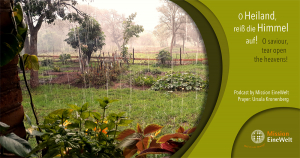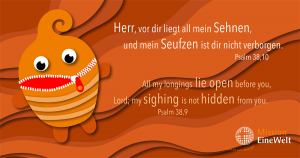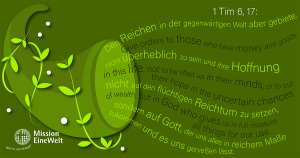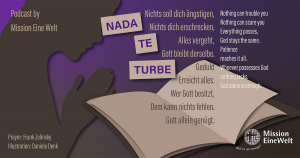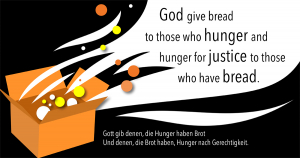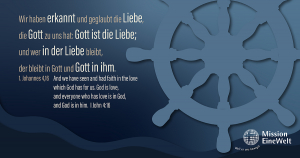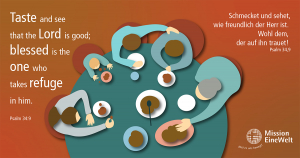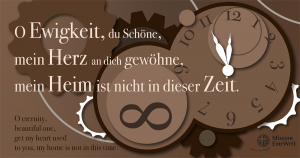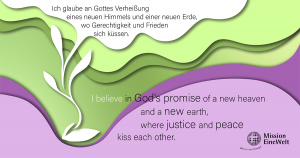Herr, vor dir liegt all mein Sehnen, und mein ist dir nicht verborgen. Psalm 38,10
Wisst, dass euer Glaube, wenn er bewährt ist, Geduld wirkt. Jakobus 1,3
Kennen Sie Sorgenfresser? Diese bunten Charaktere aus weichem Stoff mit dem großen Reißverschluss, in dem alle Sorgen und Nöte des Lebens verschwinden können? Laut Internetseite halten die Sorgenfresser nachts am Bett Albträume in Schach und drücken im Schulranzen die Daumen. Selbst um schmerzvollen Teenager-Liebeskummer oder Stress im Büro kümmern sich die Sorgen-Spezialisten. Und außerdem sind die bunten Stofffiguren prima zum Kuscheln – nicht nur für Kinder!
Was auf den ersten Blick nach einer cleveren Geschäftsidee aussieht, bedient im Grunde eine uralte Sehnsucht von uns Menschen. Die Sehnsucht nach einem Ort, einem Menschen oder einem Gott, bei dem ich all meine Sorgen und Nöte ablegen kann. Jemand, der mich kennt – vor dem ich mich nicht verstellen muss.
Herr, vor dir liegt mein Sehnen, und mein Seufzen ist dir nicht verborgen – aus den Worten des Psalmbeters spricht genau diese Sehnsucht. Doch es ist noch mehr. Es ist nicht nur eine Sehnsucht, sondern eine Gewissheit. Und diese Gewissheit speist sich aus den vielen Erfahrungen, die Menschen mit Gott gemacht haben. Erfahrungen, von denen die Bibel auf ganz unterschiedliche Weise erzählt: Erfahrungen des Glücks, der Liebe, der Bewahrung aber auch der Verzweiflung, der Sorge oder der Verlassenheit.
Aber die Bibel ist nicht nur der Ort, an dem sich mein ganzes Leben mit seinen unterschiedlichen Erfahrungen widerspiegelt – nein, sie erzählt auch davon, wie in all diesen Erfahrungen immer wieder eine Zukunft eröffnet wird. In unserem Glauben liegt nicht nur die Option, unsere Sorgen und Sehnsüchte vor Gott aussprechen zu können, sondern auch das Potenzial, Lebens- und Zukunftsgestalter*innen zu werden.
Andacht: Hanns Hoerschelmann, Direktor Mission EineWelt
Illustration: Daniel Denk, Öffentlichkeitsarbeit, Mission EineWelt
All my longings lie open before you, Lord; my sighing is not hidden from you. Psalm 38,9
Because you know that the testing of your faith produces perseverance. James 1,3
Do you know worry-eater? These colorful characters made of soft fabric with the large zipper in which all the worries and needs of life can disappear? According to the website, those worry-eaters keep nightmares at bay at night and keep their fingers crossed in their school bags. The worry specialists even take care of painful teenage heartache or stress in the office. And what’s more, the colorful characters are great for cuddling – not just for children!
What at first glance looks like a clever business idea actually serves an age-old longing of us humans. The longing for a place, a person or a God, where I can put all my worries and needs aside. Someone who knows me – before whom I don’t have to pretend.
All my longings lie open before you, Lord; my sighing is not hidden from you – the words of the Psalmist speak precisely of this longing. But there is more. It’s not just a longing, it’s a certainty. And this certainty is fed by the many experiences that people have had with God. Experiences that the Bible tells of in very different ways: experiences of happiness, love, preservation, but also despair, worry or abandonment.
But the Bible is not only the place where my whole life with its different experiences is reflected – no, it also tells about how a future is opened up again and again in all these experiences. And so the worry eater will also become a life and future designer.
Prayer: Hanns Hoerschelmann
Illustration: Daniela Denk
Es sind verschiedene Gaben; aber es ist ein Geist. (1.Kor. 12:4). Ein toller Gedanke, finde ich. Wo Christinnen und Christen zusammenkommen, herrscht keine triste Einheitlichkeit, sondern bunte Vielfalt. Gottes Geist setzt Begabungen frei und macht Menschen kreativ.
Ein Bild für diese kreative Vielfalt ist für mich ein Mosaik. Es besteht aus vielen Steinen mit vielfältigen Farben und Formen. Am Ende ergibt es ein Bild, das wir anschauen können, das uns berühren kann und einfach schön ist. Wenn christliche Gemeinschaft diese kreative Vielfalt ausstrahlt, fühlen sich Menschen in ihr wohl und sie kann berühren und inspirieren.
Am kommenden Samstag sind wieder junge Menschen aus der Evangelisch-Lutherischen Kirche in Bayern und ihren Partnerkirchen zu einem „Global Worship“ eingeladen. Sie treffen sich im Internet und wollen diese Vielfalt erleben, Hoffnungen und Sorgen austauschen, neue Perspektiven gewinnen, ihre Gaben und wie sie im Geist Gottes leben können, reflektieren. Wer mitmachen will kann sich heute noch registrieren: https://mission-einewelt.de/wp-content/uploads/2020/11/2020_gifted_invitation.pdf.
Andacht: Michael Seitz, Referat Mission Interkulturell, Mission EineWelt
Illustration: Daniela Denk, Öffentlichkeitsarbeit, Mission EineWelt
There are varieties of gifts, but the same Spirit. (1.Cor. 12:4). A great thought, I think. Where Christians come together, there is no dull uniformity, but colourful diversity. God’s Spirit sets gifts free and makes people creative.
This creative diversity is like a mosaic for me. It consists of many stones with manifold colours and shapes. In the end, it results in a picture that we can look at, that can touch us and is simply beautiful. When a Christian community reflects this creative diversity, people feel comfortable in it and it can touch and inspire.
Coming Saturday, young people from the Evangelical Lutheran Church in Bavaria and its partner churches are again invited to a „Global Worship“. They will meet in the internet and want to experience diversity, exchange hopes and worries, gain new perspectives, reflect their gifts and how they can live in God’s Spirit. Those who want to take part can still register today: https://mission-einewelt.de/wp-content/uploads/2020/11/2020_gifted_invitation.pdf.
Prayer: Michael Seitz
Illustration: Daniela Denk
Den Reichen in der gegenwärtigen Welt aber gebiete, nicht überheblich zu sein und ihre Hoffnung nicht auf den flüchtigen Reichtum zu setzen, sondern auf Gott, der uns alles in reichem Maße zukommen und es uns genießen lässt. 1.Tim.6,17
Der Losungsvers aus dem neuen Testament macht heute an uns eine klare Ansage. Es geht um Reichtum und Hoffnung!
Wie ist das nun mit dem Reichtum? Ist Reichtum ein Segen oder ein Fluch?
Eine einfache Schwarz-Weiß-Antwort finden wir in der Bibel nicht, auch nicht im Abschnitt des 1. Timotheusbriefs. Weder wird Reichtum an sich verworfen, denn immerhin heißt es: „Gott lässt uns alles in reichem Maße zukommen und genießen“. Noch wird ein „Prosperity-Gospel“ verkündet: im Sinne von „Wohlstand und Reichtum ist der Lohn für ein auch vor Gott erfolgreiches Leben“.
Den „Reichen“ werden vielmehr zwei Gesichtspunkte vor Augen gehalten.
Worauf setzt ihr eure Hoffnung?
Auf Wohlstand und Reichtum die Hoffnung zu setzen, ist trügerisch. Denn nüchtern betrachtet ist beides „flüchtig“. Unsere Hoffnung auf Gott stellt uns Christ*innen in einen stärkeren Wirkungskreis.
Reichtum verpflichtet
Besitz und Reichtum hat nach biblischem Verständnis niemand für sich selbst und alleine. Entsprechend darf unser Sinn nicht nur auf Gewinnerzielung fixiert sein, sondern hat das Gemeinwohl im Blick. Selbst ein kleiner Geldbetrag bewirkt Gutes.
Wir stehen vor der Advents- und Weihnachtszeit. Lasst uns deshalb beides tun:
- Uns erinnern, an die Hoffnung, die Gott uns schenkt und genießen, was er uns gibt.
- Im Großen wie im Kleinen das Gemeinwohl, unsere Nachbarin, Geflüchtete, Senior*innen im Blick haben, freigebig sein und Gutes tun.
Andacht: Elfriede Hauenstein, Ausstellung einBlick, Mission EineWelt
Illustration: Daniela Denk, Öffentlichkeitsarbeit, Mission EineWelt
Give orders to those who have money and goods in this life, not to be lifted up in their minds, or to put their hope in the uncertain chances of wealth, but in God who gives us in full measure all things for our use. I Timothy 6:17
The bible verse for today from the new testament gives us a clear message. It’s about wealth and hope!
How is that with wealth? Is wealth a blessing or a curse? We can’t find a clear-cut answer in the bible, also not in the chapter of I Timothy. Neither is wealth per se rejected, because at least it says: “God gives us in full measure all things for our use”. Nor is a “prosperity gospel proclaimed”: in the sense of prosperity and wealth, this is the reward for a life that is also successful before god.
The rich are kept in mind two points of view:
Wherein do you put your hope?
To put your hope in prosperity and wealth is deceptive, because viewed soberly both is volatile. Our hope in god puts us Christians in a stronger sphere of influence.
Wealth is an obligation
According to biblical understanding nobody has possession and wealth for themselves. Accordingly our sense must not only lie in making profit, but also has the common good in mind. Even a small amount of money can do good.
We are approaching the advent and christmas season. Let’s do both:
- Remembering the hope god gave us and enjoying what he gives us.
- Keep an eye on the common good, the neighbours, the refugees, senior citizens, be generous and do good.
Prayer: Elfriede Hauenstein
Illustration: Daniela Denk
Selig sind die hungert und dürstet nach Gerechtigkeit, denn sie sollen satt werden. Matthäus 5,6
Am Freitag dieser Woche ist es wieder so weit: „Black Friday“. Schon jetzt werden wir in den social media und auf diversen Internetplattformen sowie in Werbeprospekten auf das große Ereignis hingewiesen, das es auf keinen Fall zu verpassen gilt: der Schnäppchenjägertag „Black Friday“. Schon im Vorfeld gibt es die „Black Spar Week“ – fette Rabatte für meist überflüssige Dinge, die ich mir kaufen soll.
Das Gefühl, etwas günstiger gekauft zu haben, als es eigentlich kostet oder wert ist, soll mich glücklich machen und befriedigen.
Die Bibel weist uns einen völlig anderen Weg zum Glück:
Selig sind, die hungert und dürstet nach Gerechtigkeit, denn sie sollen satt werden, heißt es in Matthäus 5,6.
Die Aufforderung zu sozialer Gerechtigkeit, fairer Entlohnung sowie der Achtung der Menschenwürde im wirtschaftlichen und gesellschaftlichen Miteinander zieht sich wie ein roter Faden durch die Bibel. Sie ist fest verankert im Prinzip der christlichen Nächstenliebe. Nicht das viel Haben, sondern das miteinander in guten, gelingenden, gerechten Beziehungen zu Sein, macht glücklich, so die Botschaft Jesu.
Black Fridays gaukeln uns vor, dass ein fairer Lohn für die Arbeiter*innen, die das Produkt hergestellt haben, nicht wichtig ist, Hauptsache billig ist die Devise, Hauptsache, ich habe einen Gewinn gemacht, Hauptsache, mir geht´s gut.
Warum eigentlich nicht stattdessen: Hauptsache, es gibt mehr Gerechtigkeit, Hauptsache, alle Menschen können menschenwürdig leben?
Eine Initiative, die sich für mehr soziale Gerechtigkeit und faire Entlohnung in den weltweiten Lieferketten der bei uns kaufbaren Produkte einsetzt, ist die Initiative Lieferkettengesetz.de. Unternehmen sollen entlang ihrer globalen Produktionsketten soziale und ökologische Standards einhalten und bei Verstößen dafür haftbar gemacht werden können. Im Moment wird dieses Gesetz noch von der Wirtschaftslobby und Bundeswirtschaftsminister Altmaier blockiert. Warum also nicht in dieser Woche vom Black Friday eine Mail an Minister Altmaier schreiben und ihn zum Einsatz für mehr Gerechtigkeit auffordern:
https://lieferkettengesetz.de/#e-mail-an-altmaier
#BlackFriday #Lieferkettengesetz #BLACKFRIDAYschickSALE
Denn: Selig sind, die hungert und dürstet nach Gerechtigkeit, denn sie sollen satt werden.
Ich schließe mit diesem Gebet aus Brasilien:
Gott gib denen, die Hunger haben Brot
Und denen, die Brot haben, Hunger nach Gerechtigkeit.
Amen
Andacht: Gisela Voltz, Referat Entwicklung und Politik, Mission EineWelt
Illustration. Daniela Denk, Öffentlichkeitsarbeit, Mission EineWelt
Blessed are those who hunger and thirst for righteousness, for they shall be filled Matthew 5:6
On Friday this week it’s time again for „Black Friday“ – already now we are being pointed out in the social media and on various internet platforms as well as in advertising leaflets to the big event which is not to be missed by any means: the bargain hunter day „Black Friday“. Already in the run-up there is the „Black Week“ – fat discounts for mostly unnecessary things that I should buy. The feeling of having bought something cheaper than it actually costs or is worth, should make me happy and satisfy me. The Bible shows us a completely different way to happiness: Blessed are those who hunger and thirst for righteousness, for they shall be filled (Matthew 5:6)
The call for social justice, fair wages and respect for human dignity in economic and social interaction runs like a red thread through the Bible. It is firmly anchored in the principle of Christian charity. Not having much, but being together in good, successful, just relationships makes us happy, according to the message of Jesus. Black Fridays make us believe that a fair wage for the workers who made the product is not important, the main thing is cheapness, the main thing is that I made a profit, the main thing is that I’m fine. Why not instead: The main thing is that there is more justice, the main thing is that all people can live in dignity?
One initiative that works for more social justice and fair wages in the worldwide supply chains of the products that can be bought from us is the Initiative Lieferkettengesetz de.
Companies should comply with social and ecological standards along their global supply chains and be able to be held liable for violations. At the moment this law is still being blocked by the economic lobby and the German Minister of Economics, Altmaier. So why not write a mail to Minister Altmaier this week from Black Friday and call on him to work for more justice:
https://lieferkettengesetz.de/#e-mail-an-altmaier
For: Blessed are they that hunger and thirst for righteousness, for they shall be filled.
I conclude with this prayer from Brazil:
God give bread to those who hunger and
hunger for justice to those who have bread.
Amen.
Prayer: Gisela Voltz
Illustration: Daniela Denk
Wir haben erkannt und geglaubt die Liebe, die Gott zu uns hat: Gott ist die Liebe; und wer in der Liebe bleibt, der bleibt in Gott und Gott in ihm. 1. Johannes 4,16
Wir haben erkannt und geglaubt. Können wir das: erkennen und glauben? Es scheint zunächst ein Gegensatz zu sein, aber damit soll unsere Gewissheit gefestigt werden: Gott liebt uns. Aber nicht auf eine vergängliche Art, wie ein warmer Frühlingswind, der alle verzaubert. Wer ist Gott? Johannes ruft uns die Antwort zu: Wenn ihr überleben wollt, haltet euch daran fest: Gott ist die Liebe. Unser Lebensschiff schwankt und schaukelt, aber Gottes Liebe hält unser Steuer fest und bringt uns endlich ans Ziel. Mögen Stürme toben oder Nebel uns die Sicht versperren, die Liebe dringt auch durch die undurchdringliche Finsternis. Das Ich, Ich, Ich wird ganz unwichtig, nur noch Gottes Liebe hat Gewicht, sie versöhnt und eint, schafft Gemeinschaft mit Gott und unseren Schwestern und Brüdern.
Dafür wollen wir ihm danken. Amen
Andacht: Karl Lippmann
Illustration: Daniela Denk
And we have seen and had faith in the love which God has for us. God is love, and everyone who has love is in God, and God is in him. I John 4:16
We have come to know and to believe. Knowledge and Belief belong together to show the unity and urgency: God loves us. It is not the feeling of a lovely spring evening that consumes our mind. Who is God? John gives us the answer. If you want to survive, keep in your heart and mind: God is Love. May our vessel of life be not seaworthy, God’s love is in command and brings us to the expected harbour. May there be storm and fog. We see only darkness, but God’s love penetrates our darkness and night. Our own EGO, our me, me, me does not help us. Only God’s love has the power, it unites us into the body of Christ and the unity with our sisters and brothers.
That is reason enough to be thankful to God. Amen
Prayer: Karl Lippmann
Illustration: Daniela Denk
Schmecket und sehet, wie freundlich der Herr ist. Wohl dem, der auf ihn trauet! Psalm 34,9
Kommt, alles ist schon bereit! Lukas 14,17
„Essen ist fertig!“ – Wann immer dieser Ruf bei uns durchs Haus schallt, entwickelt sich eine gewisse Unruhe. Jede*r unterbricht das, was sie oder er gerade tut, und macht sich auf den Weg zum Esstisch. Manchmal riecht es schon verheißungsvoll. Manchmal kommt jemand in der Küche vorbei und fragt neugierig: „Was gibt’s denn heute?“ Und manchmal bekommt der Koch oder die Köchin beim Anblick dessen, was auf dem Tisch steht, ein anerkennendes „Das sieht aber lecker aus“ zugesprochen.
Die Essenszeiten sind immer etwas Besonderes. Sie dienen nicht nur der Nahrungsaufnahme, sondern sie sind auch ein Ort des gegenseitigen Austausches und Miteinanders. Sie bieten die Möglichkeit, die jeweils eigene Befindlichkeiten miteinander zu teilen, einander zuzuhören und zu stärken: „Wie geht’s dir heute? Wie war es in der Schule? Gab es etwas Besonderes auf der Arbeit? Oder: Müssen wir noch etwas für morgen besprechen?“
Ja, wer am Tisch zusammenkommt, wird nicht nur körperlich gestärkt und gesättigt, sondern auch seelisch. Gemeinsame Mahlzeiten können leibliche und seelische Geborgenheit vermitteln. Nicht umsonst spricht man deshalb bei manchen Gerichten auch von Soul-Food – Seelennahrung!
„Kommt, alles ist bereit!“ Wann immer ich diese Einladung Gottes höre, kann ich darauf vertrauen: An diesem Tisch gibt es mehr als Essen! Ich bin eingeladen zu schmecken, zu fühlen und zu sehen, wie freundlich Gott zu mir sein will. Wenn das keine Einladung ist!
Andacht: Hanns Hoerschelmann, Direktor Mission EineWelt
Illustration: Daniels Denk, Öffentlichkeitsarbeit, Mission EineWelt
Taste and see that the Lord is good; blessed is the one who takes refugein him. Psalm 34,8
Come, for everything is now ready! Luke 14,17
“Food is ready!” Whenever this call echoes through our house, a certain unrest develops. Everyone interrupts what they are doing and makes her or his way to the dining table. Sometimes it smells promising. Sometimes someone comes by in the kitchen and asks curiously: „What’s for dinner?“
Meal times are always something special in the course of the day. They are not only used for food intake, they are also a place for mutual exchange and togetherness. They offer the opportunity to share one’s own sensitivities with one another, to listen to one another and to strengthen each other. „How are you today? How was school? Was there anything special at work?“ Or: „Do we have to discuss something for tomorrow?“
Yes, those who come together at the table are not only physically strengthened and satisfied, but also mentally. Having a meal together can provide physical and emotional security. It is not for nothing that some dishes are therefore referred to as Soul Food!
“Come, for everything is now ready!” Whenever I hear this invitation from God I recieve the promise, that there is more than food at this table! I am invited to taste, feel and see how kind God wants to be to me. If that’s not an invitation!
Prayer: Hanns Hoerschelmann
Illustration: Daniela Denk
Ein Tag, der sagt´s dem andern,
mein Leben sei ein Wandern,
zur großen Ewigkeit.
Als ich ein Kind war, hatten wir dieses Lied als Familie gesungen. Im Fichtelgebirge. In meiner Erinnerung ein Lied von Freiheit, Abenteuer und Zuversicht. Wir waren eine Missionarsfamilie, davor waren wir viele Jahre am Viktoriasee gewesen, und später ging es an den Kilimandscharo. Christliche Gottesdienste, die waren für mich auch auf Kihaya oder Kiswahili, in unserer Familiensprache hatten wir so einige englische Wörter.
Ich mag Migrant*innen, auch weil ich selbst einer bin.
O Ewigkeit, Du schöne,
mein Herz an Dich gewöhne,
mein Heim ist nicht in dieser Zeit.
(Text: Gerhard Tersteegen, Melodie: Heinrich Isaak)
Bis heute mag ich Zwischenzeiten und Zwischenräume, bin gerne mittendrin und gleichzeitig am Rande, mag dritte Räume, Übergänge und Transformationen. Zwei und zwei waren gestern vier – aber wird das morgen auch so sein? Neben der Theologie hätte ich dann gerne auch Mathematik studiert: Über das Unendliche nachdenken. Sie erinnern sich vielleicht: die liegende Acht als Zeichen dafür. Die Null, die irgendwie Nichts ist, und doch so große Bedeutung hat. Die Logik mit ihrer schönen Beständigkeit und Verlässlichkeit.
Gottes schöne Ewigkeit trägt uns und behütet uns. Sie scheint immer wieder auf bei uns. Die Schönheit wird die Welt retten.
Andacht, Gottfried Rösch, Referat Mission Interkulturell, Mission EineWelt
Illustration: Daniela Denk, Öffentlichkeitsarbeit, Mission EineWelt
One day tells the next,
my life is a wandering,
to the great eternity.
When I was a child, we had sung this song as a family. In the Fichtelgebirge. In my remembrance a song of freedom, adventure and confidence. We were a missionary family, we had been at Lake Victoria for many years, and later we went to Kilimanjaro. Christian services for me were also in Kihaya or Kiswahili, we had some English words in our family language. I like migrants also because I am one myself.
O eternity, beautiful one,
get my heart used to you,
my home is not in this time.
(Text: Gerhard Tersteegen, Music: Heinrich Isaak)
To this day I like in-between-times and -spaces, I like to be in the middle and at the same time on the edge, I like third spaces, transitions and transformations. Two and two were four yesterday – but will it be the same tomorrow? In addition to theology, I also liked studying mathematics: Thinking about infinity. You may remember: the lying eight as a sign of it. The zero, which is somehow nothing, and yet has such great significance. Logic with its beautiful consistency and reliability.
God’s beautiful eternity carries us and protects us. Beauty will save the world.
Prayer: Gottfried Rösch
Illustration: Daniela Denk
Lass ab vom Bösen und tue Gutes; suche Frieden und jage ihm nach! Psalm 34,15
In den zehn Tagen vor dem Buß- und Bettag feiern wir in Deutschland seit 40 Jahren die Ökumenische Friedensdekade.
Frieden – hebräisch: Schalom. Der biblische Schalom ist viel mehr als die Abwesenheit von Krieg oder Streit: Schalom ist die große Vision eines Zusammenlebens, in dem Gewalt überwunden ist, in dem Ungerechtigkeit aufhört, in dem unsere Beziehungen heil werden, in dem alle menschliche Aktivität mit der Ruhe des Sabbats in Balance kommt. Die Bibel ist voll von Geschichten und Sprüchen, die uns den Weg zum Frieden weisen wollen.
Wie können wir Frieden finden?
Die Bibel gibt uns verschiedene Antworten:
Durch Respekt gegenüber unseren Mitmenschen und unserer Mitwelt, indem wir die Rechte unserer Mitmenschen auf der ganzen Welt auf ein Leben in Würde und Freiheit achten.
Durch ein Miteinander in Gerechtigkeit, indem wir weltweit versuchen, fair und gleichberechtigt miteinander umzugehen und nicht nach dem Recht des Stärkeren zu verfahren, und diese Gerechtigkeit auch immer wieder einfordern.
Im Gebet. Das Gebet ist das größte Kraftzentrum für den Frieden. Im Gebet kann ich meinen Unfrieden vor Gott bringen. Das Gebet öffnet in meinem Herzen die Tür für den Schalom, für den inneren Frieden, der die Keimzelle ist für den Frieden in meinen Beziehungen und für mein Friedens-Engagement in der Welt.
Und letztlich in Christus, durch den wir versöhnt sind mit Gott, was uns dazu befreit, auch anderen zu verzeihen sowie im Frieden mit uns selbst, mit anderen und mit Gott zu leben.
In diesem Sinne lade ich Sie ein, das Bekenntnis zu Frieden und Gerechtigkeit bei der ökumenischen Weltversammlung der Christ*innen in Seoul 1990 zu beten.
Ich glaube an Gott, der die Liebe ist
und der die Erde allen Menschen geschenkt hat.
Ich glaube nicht an das Recht des Stärkeren,
an die Stärke der Waffen,
an die Macht der Unterdrückung.
Ich glaube an Jesus Christus,
der gekommen ist, uns zu heilen,
und der uns aus allen tödlichen Abhängigkeiten befreit.
Ich glaube nicht, dass Kriege unvermeidbar sind,
dass Friede unerreichbar ist.
Ich glaube nicht, dass Leiden umsonst sein muss,
dass der Tod das Ende ist,
dass Gott die Zerstörung der Erde gewollt hat.
Ich glaube, dass Gott für die Welt eine Ordnung will,
die auf Gerechtigkeit und Liebe gründet,
und dass alle Männer, Frauen und Diverse, Kinder und Alte, Menschen verschiedener Hautfarbe°
gleichberechtigte Menschen sind.
Ich glaube an Gottes Verheißung
eines neuen Himmels und einer neuen Erde,
wo Gerechtigkeit und Frieden sich küssen.
Ich glaube an die Schönheit des Einfachen,
an die Liebe mit offenen Händen,
an den Frieden auf Erden.
Amen.
(° Ergänzung der Autorin)
Andacht: Gisela Voltz, Referat Entwicklung und Politik, Mission EineWelt
Illustration: Daniela Denk, Öffentlichkeitsarbeit, Mission EineWelt
Turn from evil and do good; seek peace and pursue it. Psalm 34,15
In the ten days before Penance and Prayer Day, we have been celebrating the Ecumenical Peace Decade in Germany for 40 years. Peace – Hebrew: Schalom. The biblical Shalom is much more than the absence of war or conflict: Shalom is the great vision of a coexistence in which violence is overcome, in which injustice ceases, in which our relations are healed, in which all human activity comes into balance with the rest of the Sabbath. The Bible is full of stories and proverbs that want to show us the way to peace.
How can we find peace? The Bible gives us various answers:
By respecting our fellow human beings and our fellow world, by respecting the rights of our fellow human beings around the world to a life of dignity and freedom.
By working together in justice, by trying to deal with each other fairly and equally worldwide and not by the law of the stronger and to demand this justice again and again.
In prayer. Prayer is the greatest power centre for peace. In prayer I can bring my discord before God. Prayer opens the door in my heart for shalom, for inner peace, which is the seed for peace in my relationships and for my commitment to peace in the world.
And finally in Christ, through whom we are reconciled with God, which makes us free to forgive others and finally to live in peace with ourselves, with others and with God.
In this spirit I invite you to pray the confession of peace and justice at the World Ecumenical Assembly of Christians in Seoul 1990.
I believe in God who is love
and who gave the earth to all human beings.
I do not believe in the right of the stronger,
In the strength of weapons,
to the power of oppression.
I believe in Jesus Christ, who has come to heal us,
and who frees us from all deadly dependencies.
I don’t think wars are unavoidable,
that peace is unattainable.
I do not believe that suffering must be in vain,
that death is the end,
that God wanted the destruction of the earth.
I believe that God wants order for the world,
based on justice and love,
and that all men, women and diverse, children and old, people of different color° are
equal people.
I believe in God’s promise of a new heaven and a new earth,
where justice and peace kiss each other.
I believe in the beauty of the simple,
in love with open hands,
in peace on earth.
Amen.
(° was added by the author)
Prayer: Gisela Voltz
Illustration: Daniela Denk
Kontakt
Postanschrift / Adresse
Postfach 68, 91561 Neuendettelsau
Hauptstraße 2, 91564 Neuendettelsau
Telefon: 09874 9-0, Fax: 09874 9-330
Mail:
Spenden
Zentrales Spendenkonto
IBAN: DE12 5206 0410 0001 0111 11
BIC: GENODEF1EK1
Evangelische Bank eG

